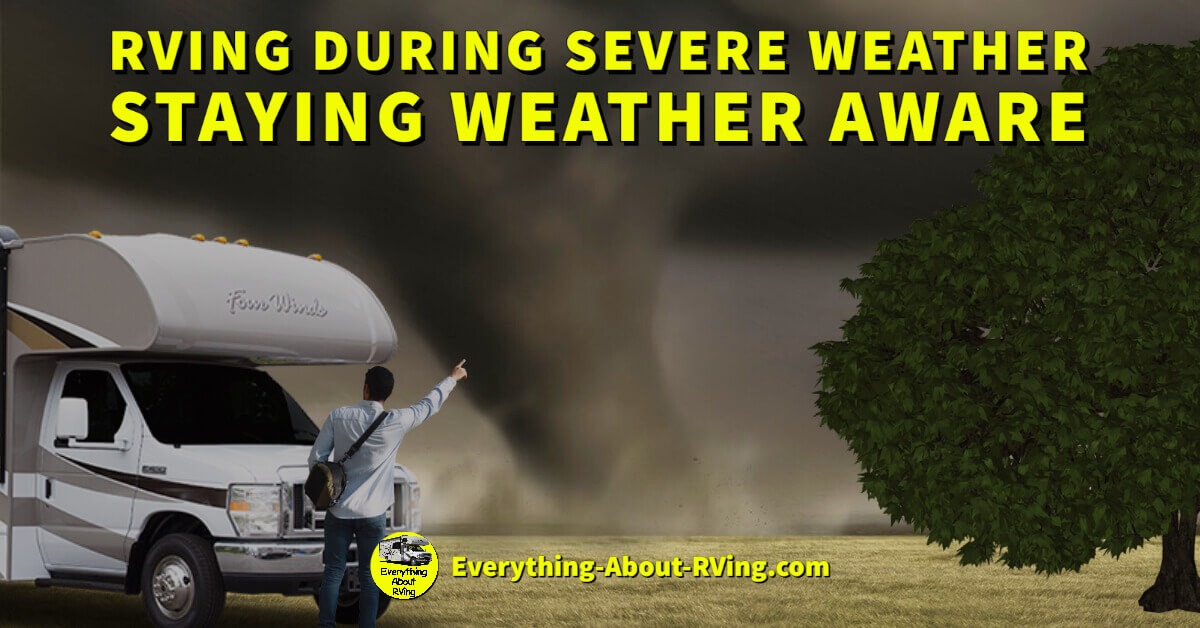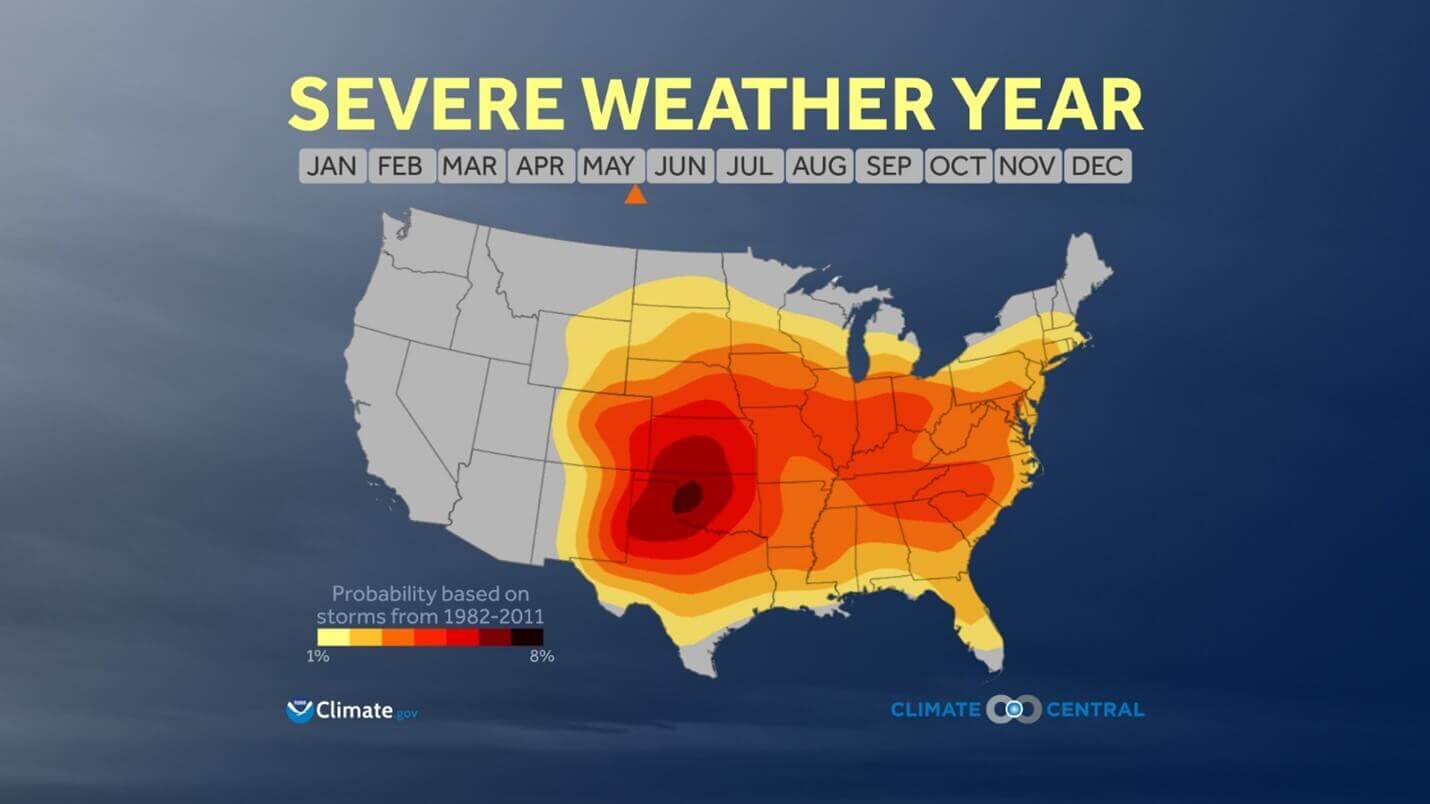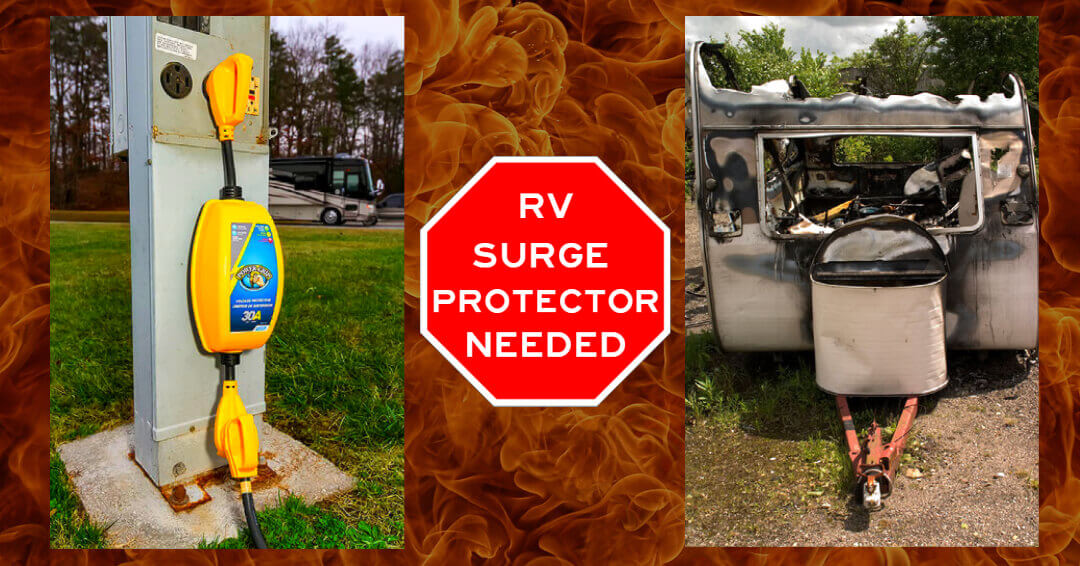- Home Page
- RVing Tips & Tricks
- Rving During Severe Weather
RVing During Severe weather
Staying Weather Aware
By Josh Roberts
These tips will help you prepare for RVing during severe weather
What you need to know about RVing during severe weather. Whether you’re camping with the bison at Caprock Canyon State Park & Trailway or relaxing in the thermal spring waters at Hot Springs National Park or visiting any number of magical places our southern states have to offer… the spring season is an excellent time of year to experience these natural wonders. On the other hand, there are other more dangerous natural phenomena to behold during this time of year: severe weather.
While severe weather can occur any time of the year in any part of the country, spring in the south is known for its violent weather events – including damaging winds, tornadoes, large hail, and flash flooding. These conditions can threaten your safety, but by following these important tips below, you can manage your risk while exploring springtime's beauty in your RV.
Know Before You Go
The National Weather Service provides tons of forecast products that help to limit severe weather surprises. "Know before you go" and understand the weather forecast for your travel destination before setting out in your RV. Add weather.gov to your list of favorite websites and check it regularly. Read the local forecasts for the particular city on your upcoming travel plans – you can even drill down to an hour-by-hour forecast for a specific location. Then craft your travel plans accordingly. Avoid areas of significant risk of severe weather and time your arrival, so you don't have to set up your RV in the pouring rain.
But remember, forecasts are just that – forecasts. It's an attempt at using meteorological science to predict the future. Use it as a tool for your travel planning, but always be prepared if those plans go "south."
Have Multiple Ways to Receive Warning
There’s an old saying about springtime weather in the south: “If you don’t like the weather now, just wait an hour.” Believe it or not, the forecasts don’t lock in the actual weather conditions you’ll experience, despite what your favorite weatherman (or weatherwoman) guarantees. Always be prepared for rapidly changing weather conditions. A few minutes advance notice might literally make the life-or-death difference.
Once you get to your destination, take a few minutes to set up alerts for your new location. Download an app to your mobile device that offers severe weather alerts via push notifications and change your alert settings to include your new location. Personally, I use myradarTM as my go-to phone weather app.
Pro tips
Another important step to take to prepare for RVing during severe weather is if you are staying at your new location for a while, check out the website for the city or county/parish emergency management office in your new location: do they have a free emergency notification system that you can register your location and contact information? If so, take a minute to create an account.
Hear that ominous siren sound? It might be an outdoor warning system that's been activated. They're common in the south, and they're only activated to warn people of current or imminent severe weather. If you hear the siren, immediately seek information from local news sources to find out the details of the threat.
Don’t rely on one warning tool for emergency notifications! There is no single warning tool that works for every person, in every situation, every time. For example, your fancy new weather app may be useless in an area with no cell service. Spend a few bucks on an All-Hazards Weather Radio and set up alerts for your new location. Trust me, the alert tones this little machine provides will ensure you'll know when severe weather threatens – it'll wake you up at night (which is another helpful feature when dangerous weather strikes overnight). Make sure you regularly replace the batteries in your all-hazards weather radio, so any storm-related power outage won't affect its ability to provide you with a warning.
Always Have a Plan of Action
“Hunkering down” in an RV isn’t the best idea during dangerous winds; in fact, an RV is one of the worst places you can be! Once you arrive at your new location, recon the area to identify a sturdy structure as a shelter of last resort. Avoid structures not fully enclosed and avoid structures with long-span roofs (like a gym), and despite what you may have seen in the movies, the underside of an overpass is not an ideal place to escape the danger. There are very few completely safe places during really bad storms, like those capable of producing an EF-3 or stronger tornado; however, there are always "safer" places than your RV. The lowest-level and most interior part of a sturdy structure can provide you a shelter of last resort if you ever have to evacuate your campsite due to damaging winds.
If you had to evacuate your campsite, how long would it take you to get to a safer place? Make sure you leave yourself enough time to get there and hunker down before the dangerous weather arrives. Depending on the level of risk you're comfortable with, yes, this might mean hitching up and driving 20 minutes to get completely out of harm's way. Better to be safe than sorry!
As the dangerous weather approaches, fire up your weather radar. Turn on the local news if you can. Monitor official sources on social media. Keep a weather eye on the sky. Pop some popcorn if you want. It'll make for a thrilling adventure and a good story to tell later around the campfire but take comfort in the fact that you’ve done your pre-planning and you know what to do if you must do it. Chances are there are other RVers at your new location who aren't paying attention and aren’t as prepared as you. Share your knowledge of approaching dangerous weather and give them the information they need to protect themselves and their friends and families.
RVs are some of our most prized possessions, but always remember things, and stuff can be replaced – people can’t.
I hope that this article has helped you prepare for RVing during severe weather. Happy RVing and stay weather aware!
About The Author
Josh Roberts, a Certified Emergency Manager®, has more than a decade of experience in responding to major disasters and providing emergency management leadership in the most disaster-prone areas of the country. Floods, fires, tornadoes, hurricanes, and more – Josh has spent a career helping communities and individuals prepare for, respond to, and recover from emergencies. When he isn’t prepping for the next disaster, you can find Josh with his family on their RV adventures, looking for the next campsite and hiking trail.




